Afghanistan War, Civil Liberties, Human Rights, Iraq Veterans, Iraq War, Supreme Court, Surveillance, Targeting Muslims, Torture, Truth to Power, War Resister
Podcast: Play in new window | Download
Updates:
—
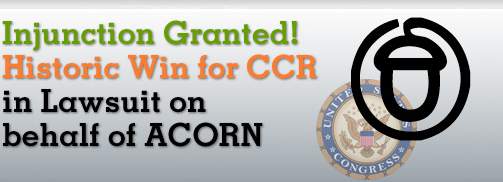
Historic Win for Constitutional Rights! Injunction Granted in CCR Lawsuit on Behalf of ACORN
Recently, a federal judge blocked Congressional effort to withhold funding to the community group ACORN. In the decision, the court found that ACORN can show that the targeting by Congress in de-funding the anti-poverty group, is a violation of the Constitution’s prohibition against the Bill of Attainder. This is a legislative act which singles out a specific person or group for punishment. Jules Lobel, CCR Vice-President and Cooperating Attorney says quote “This historic decision by the Court affirms the fundamental constitutional principle that the Congress cannot be judge, jury, and executioner.” Following the decision, Bertha Lewis, ACORN’s Executive Director, said quote “The court’s decision is a victory not only for the many dedicated citizens who work with ACORN to improve their communities and promote responsible lending and homeownership, but for the Constitution and the rights of all Americans.”
Bertha Lewis:
- ACORN is 39 years old, started in Little Rock, Arkansas. It grew out of the welfare rights movement, George Wiley founder of WRO. We began to organize folks in the South first, just around bread and butter issues.
- Red-lining banks, block busting racist strategies, potholes. Most people would know us by the housing work that we did, we challenge the banks for the red-lining tactics. I was the executive director for New York, I’ve been with ACORN for almost 20 years.
- We had an internal scandal, where the founder Wade Rasky had allowed his brother in a 2 year period of time misappropriate almost a million dollars. I was appointed CEO after that for my New York City organizing work. We’re (ACORN) the best organizers, but we’re not the best managers.
- It was fine if we stuck with soup kitchens, etc, but we started registering poor people to vote around issues. The minimum wage law passed in Florida. I think we became a threat when we actually moved those people to the polls. Now we begin to change the balance of power.
- We need to organize multi-ethnic, multi-culture, multi-issue, and build an institution where people have real power. Karl Rove leaked emails revealed : “Bring me the head of ACORN.”
- The organizing was effective because we’re not a single issue organization. We can be better managers, but I guess we had a naivete about the forces we’ve been going against all these years.
- Since 2000, the right has seen us as a growing threat, we were effective and almost immediately we were accused of voter fraud, voter registration fraud. Nothing stuck. They decided, we got to keep (ACORN) in the news, we gotta keep attacking them.
- This filmmaker – James O’Keefe made up this fantasy scenario, was racist and sexists. So, they had this series of videos, when you looked at it, it was very sensational.
- Anyone could see it was highly edited, where they had this woman say she hadn’t paid taxes, and there are these girls from Honduras we want to bring over.
- So, what you see in these tapes is some of our workers giving advice. Next thing it was online, it went viral. Funders were saying they didn’t want to be associated with us. Five hundred organizers, four hundred thousand member families.
- Three times before the Republicans tried to say ACORN was a criminal organization, no due process. In October after that video, they put in writing, no funds given to ACORN. Omnibus funding bill. The bill passed, only 7 brave senators voted against it.
- Congress (right wing) was pushed to name ACORN, because federally funded groups such as Blackwater / KBR / would be snared in broad language net. This is about the Constitution, it applies to poor people, it applies to poor people’s organizations.
- CCR lawyers – “I call them Jedi Knights for Justice”
Guest – Bertha Lewis, Chief Executive Officer and Chief Organizer of ACORN, the largest community organization in the country. Appointed in May 2008, Ms. Lewis oversees the operations of its 400,000 strong membership, which is active in over 110 cities across the country. A 16 year veteran of the organization, Ms. Lewis was most recently the Executive Director of ACORN’s New York affiliate and is a founding Co-Chair of the New York Working Families Party.
——————-
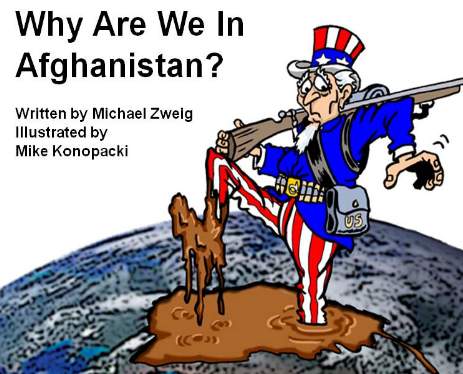
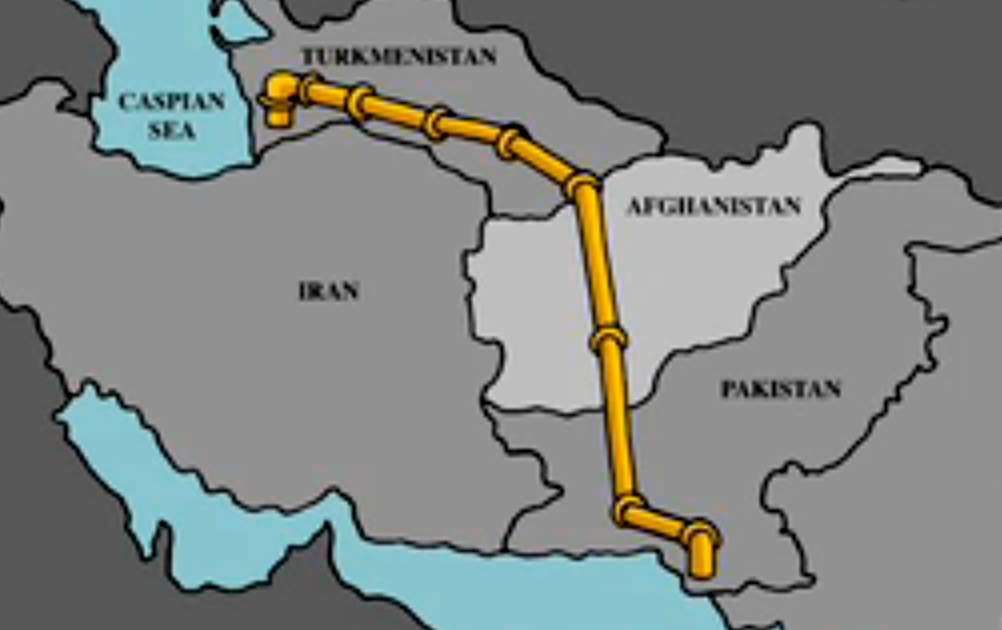
Why Are We in Afghanistan?
Why Are We in Afghanistan is the question many listeners still have and is the title of a film by Michael Zweig. The film examines how the reasons for the Afghanistan war have clouded since September 11, 2001. The conflict centers on geo-political positioning that holds the US in the war torn landscape. At this stage, the Afghanistan war is a humanitarian disaster, the civilian casualities are stunning and conditions on the ground are desperate for Afghani women and children. The film, Why Are We in Afghanistan? is an educational resource for communities, unions, veterans and active duty military, classes, and anyone who wonders why we are in Afghanistan, and what to do about it.
Michael Zwieg:
- We started out being in Afghanistan because of the 9/11 attacks, the idea was they attacked us from a base in Afghanistan, and we’re going to get the bad guys. Once they were there it became clear, that they weren’t interested in going to Afghanistan, they were interested in invading Iraq.
- Starting in 2002, the focus left Afghanistan, we were there, in an inactive state. Then comes the presumed resolution in Iraq, then Obama comes in and tries to be the president, running the campaign of prosecuting the good war.
- Why are we now doubling down in Afghanistan?
- Obama’s latest speech says primary reason for war escalation is Taliban, who are sheltering Al-Qaeda. To “nation-build” – stabilize Afghanistan. Al-Qaeda is in Pakistan, though, if you were to stabilize Pakistan, Al-Qaeda would go to Somalia, etc. It’s like wack-a-mole.
- General Petraeus’s American Counterinsurgency Doctrine. 2006
- They accept in the doctrine, that counter-insurgency is 80 percent civilian work and taking care of civilian population / 20 percent military. But if you look at the budget in place right now for 2010, it’s 6 percent civilian and 94 percent military.
- So, what’s going on? It’s not really about counterinsurgency, it’s not really about Al-Qaeda? We shouldn’t downplay the domestic and military pressure to do this.
- Sentiment about Afghanistan War changed in the US Labor movement summer of 2009
- Pipelanistan: During collapse of Soviet Union, the central asia “stan” countries came in to play.
- The US department of Energy forecasts between the year 2000 and 2025, China’s need to import oil is going to increase to 73 percent of its oil needs they will have to import.
- Pakistan’s agent in Afghanistan are the Taliban.
- Unocal – Moderate size US oil company, negotiating with Taliban and Pakistan to build pipeline.
- Unreported: There were meetings in Turkmenistan, in 2002 with the Bush Administration and Asian development Bank to build a pipeline going to Arabian Sea.
- There was a meeting in 2001 before 9/11, with Cheney and energy executives. They issued a report on American energy strategies May 2001. They identified the Central Asia republics as a major source of oil and natural gas.
- They identified these resources, Cheney and his crew, as a source to block from the Chinese and others from getting those resources.
- We’re in Afghanistan because of both strategic interests which include the oil resources and to block others.
- What are going to do, we can’t win, but we can’t not fight it. Obama doesn’t see a way unless there’s a mass movement in this country or military rebellion.
- Barbara Tuchman – March of Folly – Leaders of countries lead them into disasterous courses, against advice and alternative policies.
- You can’t reduce it all to simple, rational calculations because there are other courses that they could do.
- How do you make it hot for Obama on the decisions that he’s made? How do you build the social movement.
- We’ve built quite a presence in the labor movement around Iraq.
- Almost spending 100 billion dollars a year in Afghanistan. You could create a lot of jobs, tax relief, stimulus systems.
- War good for economy? No. For every dollar spent on military spending, you create way fewer jobs than the same money spent on building roads, or turbines for wind farms.
Guest – Michael Zwieg, Professor of Economics and Director of the Center for Study of Working Class Life at the State University of New York at Stony Brook, where he has received the SUNY Chancellor’s Award for Excellence in Teaching. His most recent books are What’s Class Got To Do With It? American Society In the 21st Century and The Working Class Majority: America’s Best Kept Secret (2000). He was executive producer and co-writer of the documentary Meeting Face to Face: The Iraq-US Labor Solidarity Tour. (Center for Study of Working Class Life, 2006).
Professor Zweig received his PhD in economics in 1967 from the University of Michigan where, as an undergraduate, he was a founding member of Students for a Democratic Society (SDS), and as a graduate student helped found the Union for Radical Political Economics (URPE).
——————————————————-
Civil Liberties, Gaza, Human Rights, Surveillance, Torture, Truth to Power, Uncategorized, War Resister
Podcast: Play in new window | Download
Updates:
——–
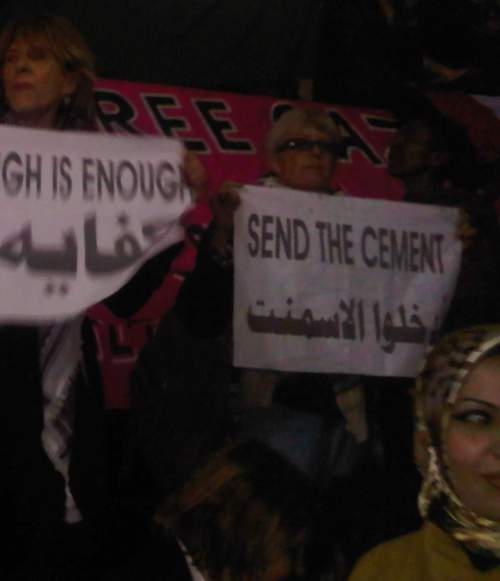
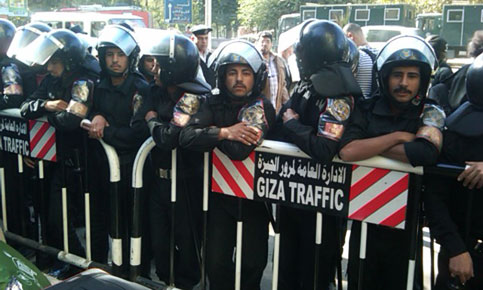
Historic International Support: Gaza Freedom March
Hundreds of activists from more than 40 countries staged demonstrations and sit-ins in Cairo to protest the Egyptian government’s refusal to allow them to cross the border into Gaza. Our own Michael Ratner and his family are among the 13 hundred solidarity marchers in the Gaza Freedom March. Among the marchers, 300 from the United States, 80 from New York State and 250 marchers from France. Last week organizers said an offer by Egyptian authorities to allow only 100 members of the group into Gaza was not enough. The Egyptian embassy has stalled the marchers and some were detained by police as crowds outside the embassies grew.
Abdeen Jabara / Dorothy Zellner:
- This has truly been one of the truly great, historic, international mobilizations of people in solidarity.
- Thousands upon thousands over the course of months have been working in over 42 countries around the globe.
- They go to Cairo, Egypt as a transit point to go to Gaza.
- This effort has heightened the consciousness about the siege on Gaza and exposed the United States, Israel and the Egyptian government to promote the division of the middle east for their own selfish reasons.
- There is the Gaza Freedom March, then there is Viva Palestina, which is a convoy of trucks loaded with humanitarian aid that actually made it into Gaza several months ago.
- Viva Palestina is led by George Galloway, former British parliament member, they are stuck in Jordan.
- The Egyptians initially said the trucks can go through but the people can’t. This is a massive international effort to prevent the Palestinians from getting the help that they need.
- The French have been lying down in the streets in front of the French Embassy for 3 days already.
- The Gaza Freedom March had been working with the Egyptians for months and it was only until the organizers got to Cairo that the Egyptians changed their decision.
- They said we didn’t come here to create any difficult for the government, we came here to stand in solidarity with the Palestinians in Gaza.
- The Egyptian government then allowed 100 people to come through to Gaza, and to give them the names in 2 hours. A divide and rule approach, more conflict against the marchers.
- Congress voted to make Egypt the second largest aid recipient in the world : 1.7 Billion annually.
- Congress tried to take 100 million dollars away from Egypt because of the “smuggling tunnels to Gaza.” Egypt got the message. Egypt is not a democracy, Mubarak has been in power since 1981. It’s essentially a police state, they more people in their intelligence and police than they have in the Army.
- Egypt is planning to put in (with the help of the US Army Corp of Engineers) metal barriers, 50 feet into the ground to prevent tunneling to Gaza. Sixty percent of the Gaza is dependent upon that tunnel trade.
- This is the largest civilian population of the world that is completely trapped. If you ever go to Gaza, this could be the Riviera of the Mediterenean. This could be an unbelievable place if they would let them live like human beings.
- The problem is with the campaign finance system and the money that keeps them in office. This is where the problem is.
Guests – Abdeen Jabara and Dorothy Zellner give a broader scope on the Gaza Freedom March and the significance of demonstrations. Abdeen Jabara, civil rights lawyer and former president of the American-Arab Anti-Discrimination Committee. Dorothy Zellner, civil rights activist with Jews Say No, who has organized groups opposing Israeli violence in the occupied territories.
—————————————-
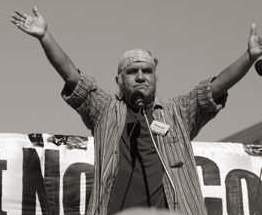
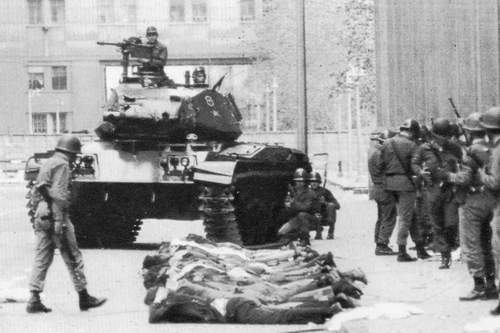
Victor Toro: Chilean Socialist Faces US Deportation After 25 Years
Ex-political prisoner and human rights organizer Victor Toro joins us in the studio. Victor is a Bronx community organizer and he was a former leader in the resistance to Chile’s military dictatorship during the 1970s. In July of 2007 Victor was arrested in an immigration sweep by border officials aboard an Amtrak train in Rochester, New York. He was charged for being in the country illegally and has been out on bail since. Before coming to the United States in 1984, Toro helped found and lead the MIR, or Revolutionary Left Movement. The group opposed the US -sponsored coup against the military dictatorship led by Augusta Pinochet. The Department of Homeland Security and US Immigration are seeking to deport Toro, the prosecution has filed a 46 page court brief containing information on the MIR, claiming the group attacked government buildings. Meanwhile, a deportation hearing for Victor Toro was adjourned until Jan. 11, 2010. Victor joins us in the studio with his translator Gonzalo Venegas.
Victor Toro:
- I was arrested by Pinochet’s regime, April 20th, 1974. I was incarcerated for 3 years in different concentration camps in which I was tortured. I was expelled from Chile, and given a document stating never to return. I was expelled to Sweden, and then Cuba.
- When I was forced to leave Chile, I was officially declared dead by the Pinochet regime.
- I ended up in Mexico, where I was given transitional asylum, however my safety was at risk in Mexico, because agents of Pinochet were trying to murder me. I left Mexico in 1984, fleeing persecution of Pinochet’s agents.
- Well, in the South Bronx, I continued doing the work, an extension of the work I had done in Chile in my earlier years. Working in the community and with unions.
- I’ve worked with undocumented people and immigrants in the United States. In California in 2007, I was engaging in the advocacy work for immigrant rights. On a train back to New York, I was caught in an immigration raid, with bomb sniffing dogs.
- Initially, I was facing the same case as any undocumented worker in the US. Recently the case took a political turn where the government has presented documents against me.
- I went from undocumented worker to becoming a terrorist because of my affiliations and work that I did in Chile in the 1970s.
- I was the leader of the organization MIR, that was building a socialist left movement. MIR resisted Pinochet’s oppressive tactics. MIR was branded a terrorist organization by the US.
- If you look at Chile’s current president of the senate, and house of representatives, the Navy, it all lead by former members of Pinochet’s political party.
- Demand asylum for Victor Toro / Friday January 8, 2010 – SEIU 1199 / Martin Luther King Auditorium. 310 West 43rd Street / between 8th and 9th Avenues.
- Monday January 11, 2010 – Court date 9 AM – / Rally afterward at NOON at 26 Federal Plaza, NY.
Guest – Victor Toro, a Chilean activist in the Bronx who fought against the Pinochet dictatorship in Chile. Toro is one of tens of thousands of immigrants who are racially profiled and targeted for deportation unjustly and unfairly.
—————————————————————————
Civil Liberties, Criminalizing Dissent, Guantanamo, Habeas Corpus, Human Rights, Surveillance, Targeting Muslims, Truth to Power
Podcast: Play in new window | Download
Updates:
WBAI Listeners Click Here For Rundown on Tito Gerassi
———–

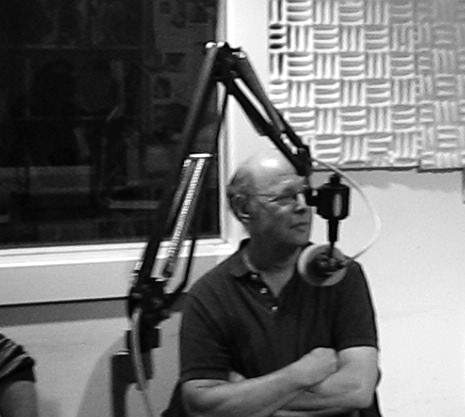
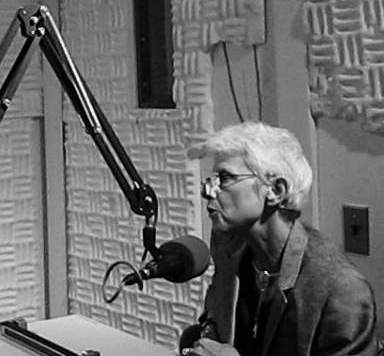
Lawyer’s You’ll Like: Rhonda Copelon Part II
This is the second part of our Lawyers You’ll Like interview with attorney Rhonda Copelon. She is a professor at the Law School of the City University of New York and director of the school’s International Human Rights Law Clinic. Rhonda is also the Legal Advisor to the Women’s Caucus for Gender Justice. Rhonda shares with us, her history of fighting for the constitutionality of the abortion cases in New York City and its effect on poor women in a pre-Roe v Wade climate. She also discuss the Harlem 6 case. Let’s have a listen.
From Article on New International Criminal Court: “The breadth and specificity of gender crimes in the court’s enabling statutes are directly attributable to a global caucus of women that formed in 1997 in the face of apathy and active resistance to prosecuting gender-based crimes. “Women made a huge difference,” said Rhonda Copeland, a professor at the Law School of the City University of New York and director of the school’s International Human Rights Law Clinic.
“They made it impossible to ignore that women have been left out of justice and that we have to be in it,” Copeland said. “If there were nobody there saying ‘this is violence,’ I don’t know how it would have happened.”Rhonda shares with listeners, her history of fighting for the constitutionality of the abortion cases in New York City and its effect on poor women in a pre-Roe v Wade climate. She also discuss the Harlem 6 case.
Rhonda Copelon:
- Harris v McRae – Rhonda Copelon argued. The case tried to get the federal government to pay for poor women’s abortions. We didn’t go to court to get medicaid for women, we went to court to save it.
- McRae has become a 2 line footnote in text books today and there’s a certain way that people have accepted that medicaid doesn’t have to pay for abortions
- 30 years is enough campaign.
- The more these terrible precedents come down, the more we absorb them as culture instead of viewing them as needing to be reversed.
- Historically, based on race and class, women have been treated differently in terms of their reproductive rights.
- When the original anti-abortion laws started to come in to the United States, it was primarily wanting to be sure that the white population of the US would not be out reproduced by the immigrant population and the way to do that was to cut back on abortion.
- The anti-abortion law, the original purposes was to increase reproduction among the elite and also to get rid of those women lay-healers.
- The original abortion laws were class based. In 20th century, class based eugenics laws, sterilization laws. Buck v Bell / you sterilize those who are socially inappropriate.
- Puerto Rican sterilization program. Before Roe v Wade, you couldn’t get a legal sterilization without the rule of 120.
- Religion twisted this around. The Catholic church in the mid 70s – a pastoral plan for pro-life activities.
- The goal was a human right amendment, which was a complete prohibition on abortion. Affecting poor women dependent on tax payer money.
- There’s a lot of evidence that the church went along with family planning in poor neighborhoods in the 60s because it had a population reduction role.
- When you get to abortion, they put the political / religious ahead of the population goals, and what you get is this mobilization to stop medicaid funding for poor women.
- In 1978, you had a historic coming together of the Catholic church and the Protestant evangelicals on the issue of abortion.
- It’s very important to look at the role of extremist religion in this country. When you look at the mega-churches, the power they’ve had to undo the first amendment, in terms of establishment of religion.
- Hyde amendment: the cutoff of medicaid.
Guest – Attorney Rhonda Copelon, professor at the Law School of the City University of New York and director of the school’s International Human Rights Law Clinic. Rhonda is also the legal adviser to the Women’s Caucus for Gender Justice.
———
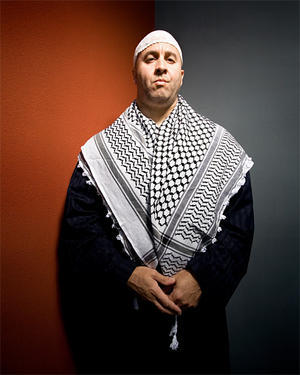
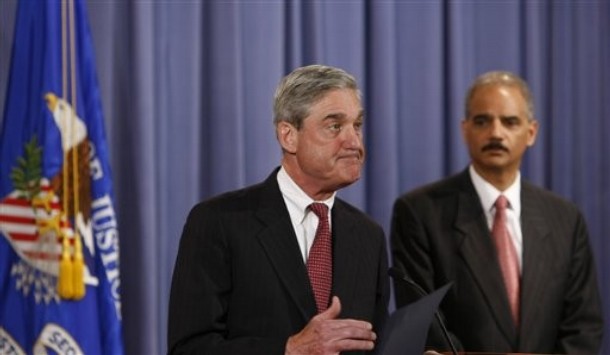
(Encore Interview:) FBI Defends Use of Informants To Spy On Mosques
FBI Director Robert Mueller defended the practice of using informants to monitor mosques in the United States, despite being heavily criticized by attorneys, and Muslim American leaders. Last month a judge ordered the FBI to submit 100 documents detailing the bureau’s surveillance of Muslim leaders in California, which revealed the FBI paid informants to be provocateurs. These cases fit into patterns where paid informants (often a former felon) entice innocent people into a crime, not unlike the Liberty 7 case, the Fort Dix case and the Memorial Day weekend terror plot in upstate New York. In the New York case, Mike German, a former FBI agent of 16 years and now an attorney with the ACLU told Law and Disorder, they “could have wrapped up without making it seem like they’re saving New York City from this terrible destruction.” The media then reports the story which will often prop up the ongoing “War on Terror.”
Shakeel Syed:
- Council of Islamic Organizations sent a letter to Attny Gen. Eric Holder complaining about the FBI infiltration and harassment
- We are baffled at this time, there is a great deal of surplus of rhetoric by the current administration and a deficit at the policy level.
- When Mueller says the FBI will escalate surveillance of mosques and the Obama Administration is silent, that disturbs me.
- This is legal religious bigotry, Mueller is lying in regard to they’re not surveilling the mosques but only the suspected individuals.
- I have stopped using the word provocateur, I shuffle between using the word provocateur and predator.
- Those targeted have pending immigration and naturalization files or converting from H1 visa to resident visa.
- When our community was doing outreach with public officers, I was in the FBI offices during 2003-2005, and I realized then I was being tailgated.
- My phone was tapped on. A few times the phone automatically dialed the local police.
- My hope as a Muslim American is that good American people will stand up in these challenging times.
Guest – Shakeel Syed, Executive Director of the Islamic Shura Council of Southern California.
———————————————————–
Afghanistan War, Civil Liberties, Criminalizing Dissent, Guantanamo, Human Rights, Supreme Court, Surveillance, Targeting Muslims, Truth to Power
Podcast: Play in new window | Download
Updates:
—–
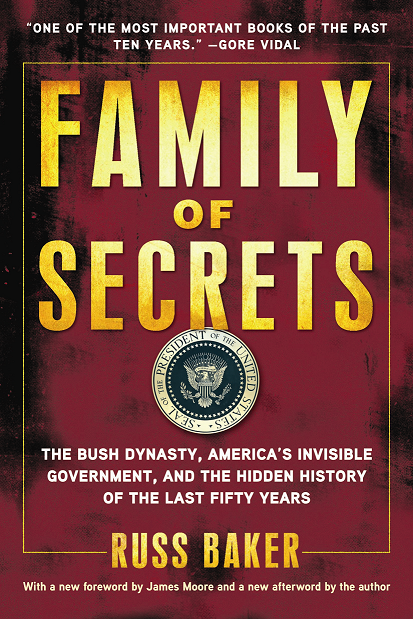
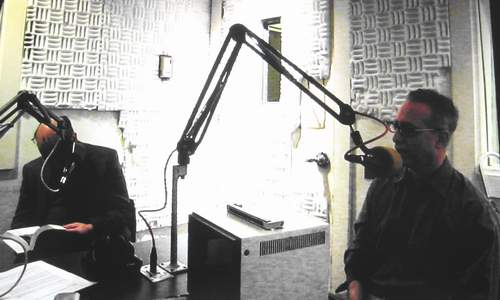
Family of Secrets: The Bush Dynasty, the Powerful Forces That Put It in the White House, and What Their Influence Means for America
From the Kennedy assassination to Watergate to Prescott Bush’s ties to Nazi Germany, the book Family of Secrets: The Bush Dynasty, the Powerful Forces That Put It in the White House, and What Their Influence Means for America, digs into the hidden history of the Bush family. Author Russ Baker takes on the Bush legacy with powerful investigative journalism. One review states that the chapter on George W Bush’s private life is worth the price of the book alone. Baker also reveals George H Walker Bush’s connections with the CIA began in 1953, not when he publicly joined the agency in 1976. Bush’s oil companies were used as fronts for the intelligence agencies around the world with an agenda controlled by power brokers. Award winning investigative reporter Russ Baker also tells us why this insight into the Bush family is important to know now during the Obama administration.
Russ Baker:
- I was training investigative journalists in Yugoslavia 2002, and when I traveled Europe people were asking me what has happened to your country. I knew superficially what happened, but I didn’t know why it happened.
- From the son, I looked into the father,because had the father not been president, the son wouldn’t be president.
- George HW Bush had a secret past more than 20 years, preceding his appointment to the CIA in 1976
- George HW Bush, starts up offshore drilling companies that make no sense, very few customers, very few rigs, but he’s traveling all over the world. It’s perfect intelligence cover.
- They even put a rig in Cuba before the Bay of Pigs, they had Cuban exiles working there
- Ok, he’s working in intelligence, I assume that’s what he’s doing while he was a Congressman, an oil man, an ambassador to the UN. This is fascinating and also deeply troubling.
- I think what we’re looking at is a permanent construct of power.
- Journalists: I don’t think they’ll say so publicly but privately they’ll tell you how scared they are, whether for their personal safety or they don’t want to lose their job.
- The Bush dynasty was the ultimate triumph of the military industrial complex that Dwight Eisenhower, a formal general had warned us about.
- Harry Truman speech on the CIA: I signed the Act that created the CIA, but they never told me the kinda things that they got in to.
- The Bush Family: You see them as the ultimate operatives on behalf of the coalition of powerful Wall St. interests, military contractors, resource extraction mining interests, going all over the world to bring back the plunder essentially.
- They (Bush family) are the representatives, they are not the bosses.
- Obama: It’s very difficult to go against these interests. Our economy runs on war, it’s very difficult to undo that.
- I, myself was naive, and I covered politics for more than 20 years, and I never understood the extent at which democracy is subverted.
- Power in America resides in pool of people about whom we’ve never even heard, the only way you find out is if you look at these Fortune 1000 lists. This is not a conspiracy, it’s just the way things work.
- Michael Smith: When I was starting out and learning how this country works, I was reading C.Wright Mills, Ferdinand Lunberg.
- Guest host Jim Lafferty: This is a matter of commonality of interests that run this country
- Whowhatwhy.com – specialized in doing deep politics investigation – historic epics that haven’t been properly explored.
- Everybody hated Kennedy except the people.
Guest – Russ Baker is an award-winning investigative reporter with a track record for making sense of complex and little understood matters. He has written for the New Yorker, Vanity Fair, the Nation, the New York Times, the Washington Post, the Village Voice and Esquire. He has also served as a contributing editor to the Columbia Journalism Review. Baker received a 2005 Deadline Club award for his exclusive reporting on George W. Bush’s military record. He is the founder of WhoWhatWhy/the Real News Project, a nonpartisan, nonprofit investigative news organization, operating at whowhatwhy.com.
——————–

MondoWeiss: The War of Ideas In the Middle East
Did the recent bombing of Gaza and killing of 1400 Palestinians create a breakdown in the traditional Jewish American support for Israel? In the first of its kind, last month’s J Street Conference brought together 1500 people to the meeting aimed at ending the Arab-Israeli and Israeli-Palestinian conflicts peacefully and diplomatically. The conference is a political arm of the pro-Israel pro peace movement that also lobbied more than 100 members of Congress to press forward with the peace process and two state solution.
Meanwhile the Boycott Divest and Sanction movement gains momentum and Code Pink activists continue to protest, demonstrate in and around Gaza. As many listeners may know living conditions in the Gaza Strip has deteriorated. Salt water has contaminated a large percentage of drinking water and is damaging the kidneys of Palestinian children.
Philip Weiss:
- J Street is the alternative Israel lobby or alternative Jewish lobby because they identify themselves as a Jewish organization.
- They are taking on AIPAC, which has traditionally taken on the role to shape the US response to Israel.
- It was landmark moment in changing the original purpose of the Israel lobby to speak with one voice
- Here’s a lobby that says. . guess what? Jews are not going to speak with one voice, we’re going to have a lot of different voices that contend on this issue.
- Finally there’s a little bit of fragmenting of this reactionary force of AIPAC and the Israel lobby.
- 160 Congressmen were at the J Street Conference in Washington DC. You saw lefty-Jews with a spring in their step. The conference disappointed me in a number of ways, it only had Zionists, progressive Zionists. It condemned the Goldstone Report
- There were some bright lights at this conference. It’s not that different from AIPAC in a number of ways.
- There was a strong sense if you were to speak there (J Street Conf.) you had to be a Zionist.
- Zionist: I think it is support for a Jewish state. We need a Jewish state because we could be persecuted again and we need to go somewhere.
- Generally the rank and file of these people are old Jewish leftys. J Street represents a break in the heresy. The heresy is that we speak with one voice. This process of colonization continues in the West Bank, unabated basically.
- One state with an apartheid system and that’s going to be the struggle. I think if you scratch any Jew in this country he has some connection to Israel. For me it was the 9/11 thing. As they say.
- My brother said, I demonstrated against the Vietnam War, as I did, but my Jewish newspaper says the Iraq War could be good for Israel.
- I couldn’t avoid the issue anymore then when I confronted the issue I became this Palestinian Solidarity person.
- The desperation is heightened by the fact there’s so little recognition of that in the United States.
- Goldstone, a Jewish Jurist from South Africa who fought apartheid and Bosnian war crimes, that he could say. . look this is persecution . . and that can be so ignored, defied and stomped on in the United States. .it’s a horror.
- Our country can affect the situation ( In Gaza / West Bank)
Guest – Peter Weiss, longtime journalist and regular contributor to the Nation and a fellow at the Nation Institute Philip is the author of two books a political novel, Cock-A-Doodle-Doo, and American Taboo, an investigative account of a 1976 murder in the Peace Corps in the Kingdom of Tonga. His website is called Mondoweiss, it explores Middle East policy and Israel/Palestine issues. Philip attended the J Street Conference 2 months ago.
————————————————————–
Civil Liberties, Death Penalty, Habeas Corpus, Human Rights, Supreme Court, Surveillance, Torture, Truth to Power
Podcast: Play in new window | Download
Updates:
————
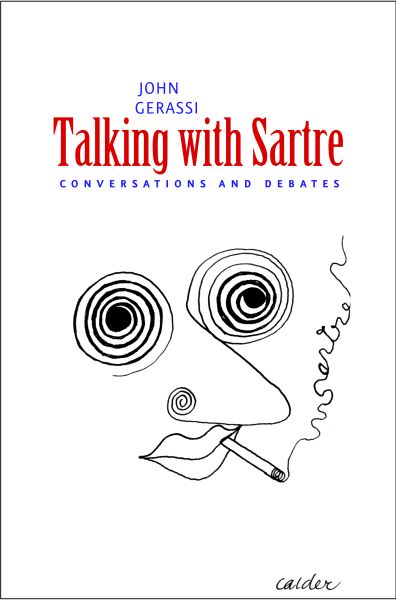
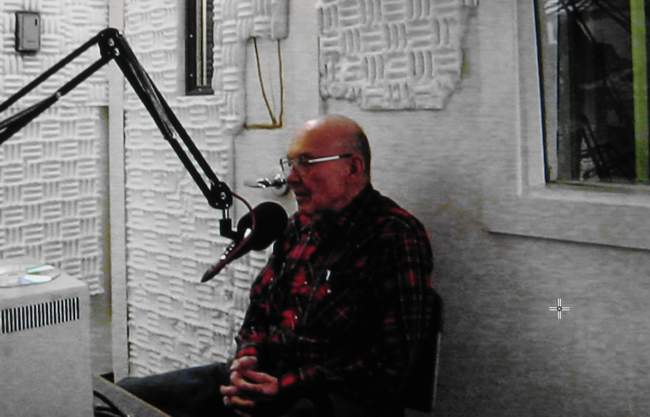
Talking With Sartre: Conversations and Debates
Professor John Gerassi, author of the recently published book titled – Talking With Sartre: Conversations and Debates joins hosts in studio. As a child, Gerassi’s parents had become close friends with the French existentialist philosopher, playwright, and novelist, Jean Paul Sartre. Later in his life, Gerassi conducted a series of interviews in the early 70s. These interviews are now edited into book form and as one review states, – quote – it has produced this revelatory and breathtaking portrait of one of the world’s most famous intellectuals.
The brings into to focus Sartre’s thinking on the Spanish Civil War, World War II, and the disintegration of colonialism, it also reveals how Sartre has wrestled with the apparent contradiction between his views on freedom and the influence of social conditions on our choices and actions.
John (Tito) Gerassi:
- My father was an artist and said ridiculous things like I don’t care if my son starves or my wife starves, first I paint.
- This appealed to Sartre who said in effect the same thing as a man of letters.
- Sartre became fascinated by my father. My father refused to join the OSS / CIA
- Gerassi to Sartre: You have a problem uniting the idea of free choice that you have in existentials because you begin with the I, to the Marxist situation which is a class derivative to which you want to align. I don’t see how you can align them.
- After a series of criticisms to this dichotomy, Sartre said, “This kid’s brilliant.” And so I became part of the family.
- Sartre always supported counterterrorism. Those who fought the establishment’s terrorism.
- Sartre’s anti-position has always been consistently correct.
- He opposed Ridgeway when Ridgeway took over NATO. Get your base out of France.
- No country is free with a foreign base on its territory. If you get rid of Ridgeway don’t put in a European general.
- During the Algerian War, the magazine that Sartre basically created called Modern Times, supported the Algerians right from the beginning.
- It supported sedition, that was a step further than any lefty in France.
- Supporting sedition is one thing, but they actually supported it in action.
- They were called the suitcase carriers, they gave medicine and ammo to Algerians in suitcases.
- The editor in chief of Modern Times assembled 120 intellectuals and produced the Declaration of 121.
- It included Sartre and existentials but also the Catholic left and notable communist intellectuals.
- That began the split in the communist party.
- In Algeria, the communist party there was in favor of the Algerian revolution.
- Sartre : Never judge the powerless by the same criteria that you judge the powerful.
- That means you support the Palestinians, and you praise the suicide bombers because you judge them with a different criteria than Israelis who have tanks, airplanes etc . .
- Sartre interpretation: The fact that he (Ft Hood shooter) is a member of a dominated class, and he is rebelling against the dominating class. He is perfectly justified in what he’s doing.
- Sartre: The trouble with all revolutions is they give up too soon.
- He did go to all sorts of places and because he was Sartre, he got to see the leaders of Russia and China, the only influence where he was pleased with contact was Che Gueverra.
- Supporting the early action of the Palestinians: When Israel subjugates the Palestinians, takes away their lands. . I’ve always supported counterterror against established terror.
- Marxist – Group Infusion – people briefly connecting, moving from I to we.
Guest – Professor John Gerassi, once an editor at Time magazine, then at Newsweek, who obtained his PhD at LSE, is a long time civil rights and anti-war militant. He is the author or editor of ten books and scores of articles and pamphlets published on both sides of the Atlantic. He is currently Professor of Political Science at the City University of New York.
———————————————–




